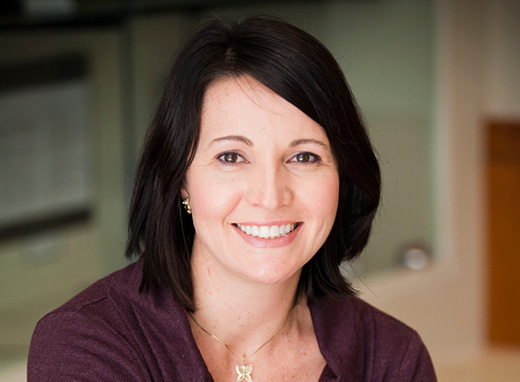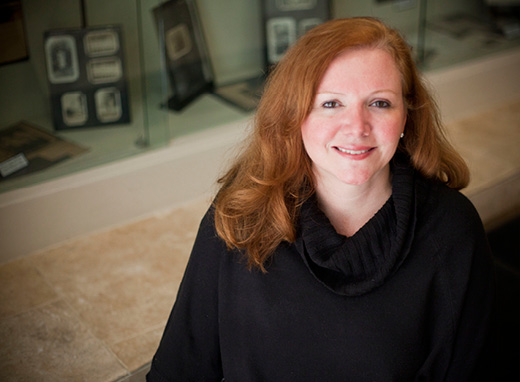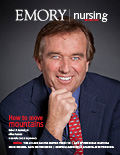Providing Care and Comfort Closer to Home
Last summer, students in the accelerated BSN/MSN program immersed themselves in clinical care at five different sites in the United States and the Caribbean. Among them were new sites in Atlanta and West Virginia, where students discovered two vastly different domestic patient populations.

|
Listen to Audio (2 min. 49 sec.) |
||
Atlanta's City of Refuge
When it came time to pick one of the nursing school's immersion-learning trips last summer, Robin Goodwin 10N 12MN (above) briefly considered the Bahamas and the Dominican Republic but then thought about how her two kids and spouse might react.
"Telling my husband I was going to the Bahamas for two weeks didn't sound like the best idea," she says in jest.
So with the good of her marriage in mind, Goodwin instead signed up for a local two-week immersion program with City of Refuge, a community-based nonprofit that provides shelter, medical care, food, and other assistance to poor and homeless city residents.
Before heading out, Goodwin assumed it would be an "immersion" in name alone. After all, nursing students working at City of Refuge could go home each night, and Goodwin had lived in Atlanta since kindergarten. How different could a community four miles from her home be?
And then came the first day of the program. To get to City of Refuge, she drove four exits west on I-20 and was there within 10 minutes. But the community west of downtown was nothing like the Atlanta she knew.
"There are broken down buildings everywhere," Goodwin says. "There's kudzu growing up over buildings. The sidewalks aren't safe. You don't see police officers stopping and talking to people like they do in other neighborhoods. They're on the go. There are very limited resources. There is no grocery store within walking distance. Here we are in this big glamorous international city, yet there's this pocket of sheer poverty."
Quickly, a fun summer program became a challenging experience for Goodwin and her four classmates, led by faculty instructor Hope Bussenius 93MN. Over two weeks, they helped out in different programs at City of Refuge, serving meals, providing day care to homeless children, and giving care to patients in the on-site clinic. They also designed and completed a quality improvement project to improve sleep hygiene for shelter residents.
For Goodwin, the hours spent with patients had special significance. "It was the first time that people in the community identified me as a nurse," she says. "To go out in the community and have people say, 'Oh, this is a nurse who knows what she's talking about and is here to help me' and having a total stranger say, 'You know what, I trust you' was priceless."
She continues to think about how the immersion will inform her career as an emergency nurse practitioner at places like Grady Memorial Hospital.
"At Grady, you're dealing with underserved populations. You're dealing with homeless people. Sometimes as a practitioner it's easy to say, 'Take your medicine, go home, you'll feel better.' But what if there is no home, no way to take the medication? My experience at City of Refuge keeps reminding me, 'Don't just take a look at the chief complaint. Look at what this person's going through.' And also be not so quick to judge."
Now immersed back in nursing school, Goodwin has no regrets about her intown adventure last summer. This summer, she and her family will head to Hawaii to celebrate her graduation.

West Virginia's coal country
|
Listen to Audio (3 min. 23 sec.) |
||
Last summer found Ashley Deringer 11N 12MN (above) following a creek up through a hollow in West Virginia. In some ways, she had come home.
Deringer grew up in rural Alabama. "All I wanted to do was escape," she remembers. But 20 years later, something shifted.
"The more I traveled, the more I realized that sometimes you really need to look in your own backyard to realize what kind of culture there is and what you can take from it and what you can learn from it," she says. "It doesn't need to be on the other side of the globe."
So when it came time for Deringer's accelerated BSN/MSN class to immerse themselves in a clinical setting, she wanted to learn how nurse practitioners transfer cutting-edge research and contemporary nursing practice into rural environments with scant medical resources. The trip to West Virginia seemed just right: A high poverty level and careers spent mining coal had taken their toll on many residents.
For two weeks last June, Deringer, six classmates, and faculty leader Carolyn Clevenger 02N 04MN GNP-BC DNP made a temporary home for themselves up near a hollow, working with four rural health clinics run by the community-owned Cabin Creek Health System.
For much of the time, the students focused on initiating a "quality improvement swat team" that reviewed 250 medical records, examining reasons why patients sometimes missed appointments. Deringer and her classmates plan to publish their findings in academic journals and have since provided feedback to Cabin Creek.
They also worked with patients suffering from mining-related ailments. "We saw a number of people with hearing damage from working in the mines and with explosives," says Deringer. "We also saw a fair number of retired coal workers with chronic back injuries and some addiction and substance abuse that they trace back to the chronic pain."
Yet other patients had never asked for chronic pain medication for fear of addiction. Here, Deringer and her classmates found they could be useful. "They were suffering in silence, so the opportunity to talk with them about options available to them short of narcotics was an enlightening experience."
But the enlightenment went two ways. While rural West Virginia has few of the resources that city-dwellers expect, community members come together to fill in gaps, such as building ramps at the homes of elderly residents for easier mobility.
"The level of community was astounding," Deringer says. She also learned how Cabin Creek had initiated successful programs to narrow health disparities usually seen in rural areas by providing home visits, on-site psychotherapy appointments, and an on-site pharmacy offering prescriptions for just a few dollars.
Deringer is applying what she learned in West Virginia to her graduate studies.
"You hear a lot in the classroom about 'know your community' and be familiar with what the community needs. I realized every community is different, and the way you serve each one is different as well."
When not in class, Deringer works and lives in Gainesville, Georgia, which serves as a regional safety net for the large rural population in several surrounding counties. This time, she has no desire to escape. "It's kind of brought me back to my roots," she says.—Dana Goldman
The Lillian Carter Center for Global Health & Social Responsibility oversees service-learning for students in Atlanta, West Virginia, South Georgia, the Bahamas, Jamaica, and the Dominican Republic.


